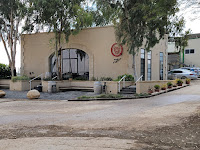The right in Israel calls this all "judicial reform" while everyone else, from centre-right to left calls it a "legal revolution" or even a "coup."
I have read various articles attempting to explain away these various proposed changes. Some commentators have used the United States as the barometer for analyzing the changes and claim that if it only moves the Israeli legal system towards the system in the U.S., it must be a good thing. Given the recent news about influence peddling in the U.S. Supreme Court, as well as the types of decisions the U.S. Court has been releasing, it seems hard to imagine that anyone who is sincerely interested in an independent and robust judiciary would be using the U.S. as a model. Sorry to offend my U.S. readers.
Others have argued that changing Israeli judicial precedents through legislation is only a way of "restoring balance" to the system and balancing out the power of the judiciary against the power of the other branches of government. But the Israeli Supreme Court has actually interfered with the government on relatively few occasions. For the most part, Prime Minister Netanyahu and the various right wing governments that he has led have enjoyed a great deal of freedom of action and have seen relatively little practical interference from the Israeli Supreme Court even though members of the current government that he leads argue that the country is "ruled" by the Supreme Court.
But the concern in Israel - and the impetus behind the demonstrations is not one particular bill or law. If the only law being proposed by the current government was this "reasonableness" law - (which is intended to change Israeli common law and bar judges from using "unreasonableness" or "extreme unreasonableness" as a grounds for judicial review of legislation of governmental action), then the Israeli public might not be so riled up.But the current government has 64 seats. 15 of those seats are from the Religious Zionist Party which is mostly made up of xenophobic, homophobic, fascists who would like turn Israel into an Iranian type regime, run according to their version of halacha - Jewish religious law.
Another 17 Knesset Members are from ultra-religious parties. While these members are mainly interested in obtaining financial support for their religious institutions and their constituents, most of them would also like to see a State ruled by halacha.
Of the remaining 32 Likud members in the current governing coalition - there seem to be several more who are supportive of these extremists. Yariv Levin, the current Minister of Justice, is one of these members. His presentation in January 2023, that I have written about previously, was nothing less than a proposal to disembowel the Supreme Court of Israel and leave it with little power to serve as an independent judicial arbiter.
Just yesterday, the leader of one of the Religious Zionist parties, and the current Minister of Internal Security, Itamar Ben-Gvir stated that this "reasonableness law" was only the first step - the appetizer - and that the whole main course was yet to be served. Last night - he said "the salad bar is open."
Surely, of all people, Israelis know what can happen to a democracy when fascists start passing laws. It can happen quickly and dramatically. And a sizeable number of Israelis recognize this and are out in the streets demonstrating and protesting. In fact, they have been demonstrating since January 2023 when Levin first announced his plans - in a press conference that reminded me of a scene from one of the Batman movies where the villain announces his plans to take over the world.
Some have characterized Prime Minister Netanyahu as the "adult in the room" and argued that he would not let Israel become undemocratic. But Netanyahu has his own concerns. He is in the midst of a criminal trial and looking to end these proceedings and avoid jail time. So while some Likud members were pushing him to try and reach some kind of compromise - his right fascist flank was threatening to leave the government and cause it to fall if he were to agree to any kind of compromise. As a result the third reading of the bill passed 64-56. No Likud members dared dissent for fear of being the ones to bring down the government. The opposition Knesset members boycotted the third vote and the bill passed 64-0.
Senior members of Netanyahu's government are talking about next steps. They have many different plans. Firing the Attorney General and other non-political office holders in Israel without any concern about judicial interference. Dismantling the Israeli bar association. Putting the convicted criminal Aryeh Deri back into office as the Minister of Finance. Passing a law to allow the current government to appoint all of the judges instead of using a balanced committee. Passing a judicial override bill to overturn any decisions of the Supreme Court by a simple majority. And even these laws are only a few of the more than 82 laws that members of this government are proposing. Oh I forgot the proposed "discrimination law" that allows a company or an individual to refuse to serve others (LBGTQ+? Arabs? Secular Jews? Women?) because of "religious reasons." (Granted this type of law has been upheld twice in recent years by the current U.S. Supreme Court but I think that was related to my earlier point...)
As a result of all of this, hundreds of thousands of Israelis are protesting. Two days ago, more than 50,000 Israelis began a two day march from Tel-Aviv to Jerusalem - where they arrived in time to protest all day today in front of the Knesset along with hundreds of thousands of others. But the bill passed anyways - and there are more bills to follow. I anticipate that the protest movement will now ramp up the type and volume of protests.
One of the discussions has centred on military service. Israel has a "people's army" where everyone is conscripted (even though there are many exemptions). Afterwards, people serve in many different roles in a voluntary capacity. Many of the volunteers, including Israeli fighter pilots and many others, have announced that they will refuse to appear for purely voluntary missions. The number of military personnel sharing these sentiments has been growing. The right wing response is that the army should be totally separate from politics - and that soldiers should report for duty no matter what. In fact, some would like to pass a new law to deal with these issues and penalize those who refuse to appear for duty. But the social contract that binds the soldiers to the state and to reporting for duty is based on their understanding that they are reporting to a democratic regime. A large number of Israeli soldiers will refuse to report for duty if the perception is that they are serving an autocratic regime.
How and where do we draw the line? Israeli soldiers do not want to harm the state and want to defend it at all costs from external enemies. But they do not want to carry out illegal orders or serve as accomplices for a regime that makes illegal or immoral decisions. We may not be there yet - but in a government that includes 15 far right extremists, some of whom are cabinet members - soldiers are concerned that there may not be any judicial oversight to actions they are now asked to carry out. That has already started to happen to the Israeli police forces - which are now being overseen by Ben-Gvir.
This government's short-sighted legal "revolution," enabled by Netanyahu out of fear for his own freedom, is causing economic problems as well. Companies, including Israeli high-tech companies, are talking about leaving or reducing their investments in the country. Individual Israelis are talking about leaving and finding work elsewhere. The Israeli Shekel has sunk dramatically against other currencies (it fell by approximately 10% today). There is a great deal of uncertainty and it is likely to get much worse. Sadly, it appears that Netanyahu's legacy will be one of severe damage to Israel's unity and its fabric as a vibrant democracy - all in the interest of saving his own skin. One commentator called it "Hanina o Heres" - "Pardon - or Destruction" meaning that Netanyahu would either get himself a pardon or he would take down the whole society with him.
All of this comes just two days before Tisha B'Av, one of the saddest days on the Jewish calendar on which we remember and commemorate the destruction of the first and second temples in Jerusalem. The standard and traditional Jewish Rabbinical explanation - is that the Temples were destroyed (in 586 B.C.E. and then again in 70 C.E.) because of "baseless hatred" between different Jewish groups. In an address this evening in Israel, one of the opposition leaders, Benny Gantz, warned that we must learn from the lessons of Tisha B'Av and find ways to work out our differences rather than take actions that could lead the country to an ever greater crisis. Sadly, there is no sign, at this point, that Netanyahu's current government has any interest in approaching these matters reasonably.
I normally try to include some other comments in my blogs about different issues but I think I will leave that to my next blog. Unfortunately, I have probably been watching and listening to far too much news and that is not giving me a warm and fuzzy feeling to end on a humorous note.
For those fasting this coming Thursday, I wish everyone a meaningful fast and I hope that Jewish people everywhere, though especially in Israel, will take the time to think about where we are today and what we need to do to stop things from deteriorating further.













